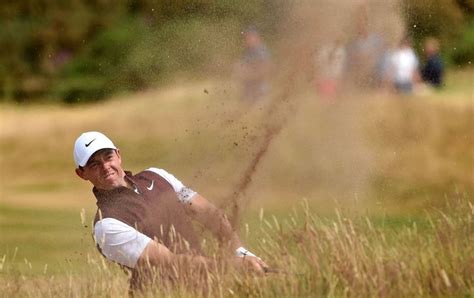
Rory McIlroy’s struggle to rediscover his peak form has sparked questions about his motivation and ability to contend consistently at the highest levels of golf, with concerns raised about whether he can reignite the competitive fire that fueled his past successes. The Northern Irishman’s recent performances have been inconsistent, prompting commentators to question whether he possesses the drive necessary to once again dominate the sport.
McIlroy, a four-time major champion, has faced a frustratingly barren run in major championships since his last victory at the 2014 PGA Championship. While he has remained a prominent figure in the world of golf, securing numerous victories in regular PGA Tour and European Tour events, the elusive fifth major continues to evade him. This prolonged drought has led to speculation about the factors affecting his performance, with motivation emerging as a central theme of discussion.
“He’s having trouble finding that level that we expect from him,” stated a golf analyst in a recent Yahoo Sports video, highlighting the visible struggles McIlroy faces on the course. This sentiment echoes the broader concern within the golfing community, where McIlroy’s undeniable talent is juxtaposed with his apparent inability to consistently perform at his best when it matters most.
The analysis points to a potential disconnect between McIlroy’s current mindset and the relentless ambition required to conquer major championships. “Does he have the motivation to really grind it out?” the analyst questioned, emphasizing the demanding nature of competitive golf and the mental fortitude required to overcome challenges. The sentiment is clear: talent alone is insufficient; an unwavering dedication to improvement and a burning desire to win are essential ingredients for success.
McIlroy’s career trajectory has been marked by periods of exceptional dominance, where his powerful drives and precise iron play made him virtually unbeatable. However, these periods have been interspersed with spells of inconsistency, characterized by erratic shots and struggles on the greens. The ability to maintain a consistent level of performance is crucial in major championships, where even minor errors can prove costly.
One of the key factors contributing to McIlroy’s struggles may be the increased competitiveness within the world of golf. The emergence of a new generation of talented players, such as Scottie Scheffler, Jon Rahm, and Viktor Hovland, has raised the bar for success. These players possess not only exceptional skill but also an unwavering determination to win, creating a fiercely competitive environment where only the most mentally resilient can thrive.
McIlroy has openly discussed the challenges of balancing his personal life with the demands of professional golf. As a husband and father, he has acknowledged the importance of prioritizing his family, which may inevitably impact his focus on the game. The need to strike a balance between personal fulfillment and professional ambition is a common challenge for many athletes, and McIlroy’s experience is no exception.
Furthermore, the pressure of expectations can weigh heavily on even the most accomplished athletes. McIlroy’s early success created immense expectations, with many predicting that he would become one of the all-time greats. While he has undoubtedly achieved considerable success, the weight of these expectations may contribute to the pressure he feels to perform at his best in every tournament.
Rekindling the fire within McIlroy may require a multi-faceted approach. Firstly, he may need to reassess his goals and reaffirm his commitment to achieving them. Setting clear and ambitious targets can provide him with the motivation he needs to push himself to the limit. Secondly, he may benefit from working with a sports psychologist to develop strategies for managing pressure and maintaining focus. Mental resilience is a critical attribute for success in competitive golf, and seeking professional guidance can help him strengthen this aspect of his game.
Thirdly, McIlroy may need to make adjustments to his training regime and playing schedule. Optimizing his physical conditioning and ensuring he is adequately rested are essential for maintaining peak performance. He may also consider focusing on specific areas of his game that require improvement, such as his putting or short game.
Finally, McIlroy may simply need to rediscover the joy of playing golf. Sometimes, the pressure to win can overshadow the inherent enjoyment of the game. By focusing on the process rather than the outcome, he may be able to relax and play with greater freedom and creativity.
The question of whether McIlroy can rekindle the fire remains open. His talent and potential are undeniable, but his ability to overcome his current challenges will depend on his willingness to adapt and evolve. The golfing world will be watching closely to see if he can rediscover the motivation and form that made him one of the most exciting players of his generation.
In-Depth Analysis of McIlroy’s Current Form
Rory McIlroy’s current predicament is not simply a case of declining skills. A more nuanced examination reveals a complex interplay of factors that contribute to his intermittent performances, particularly in major championships. His swing remains one of the most admired in golf, capable of producing prodigious distance and pinpoint accuracy. However, the mental aspect of the game, coupled with strategic decision-making under pressure, appears to be the area where he falters most frequently.
The Weight of Expectation:
From his early triumphs, including his dominant victory at the 2011 U.S. Open, McIlroy was anointed as the heir apparent to Tiger Woods. This label, while complimentary, placed immense pressure on him to consistently contend for and win major championships. The golfing landscape has since evolved, with a deeper pool of talented players capable of winning any given tournament. McIlroy, perhaps unfairly, is still judged against the lofty expectations set early in his career, adding to the psychological burden he carries onto the course.
Strategic Lapses and Course Management:
While McIlroy’s raw power is a significant asset, it can also be a liability if not harnessed with strategic precision. In crucial moments, particularly on demanding major championship courses, he has been prone to aggressive shot selections that backfire, leading to costly bogeys or worse. Effective course management, which involves understanding the nuances of each hole and making calculated decisions based on risk-reward assessments, is paramount for major championship success. Instances where McIlroy has deviated from this disciplined approach have often proven detrimental.
Putting Woes and Short Game Inconsistencies:
Historically, McIlroy’s putting has been a streaky element of his game. While capable of holing clutch putts under pressure, he has also experienced periods of inconsistency on the greens. Major championships often hinge on making critical putts to save par or convert birdie opportunities. Similarly, his short game, encompassing chipping and pitching around the greens, has occasionally lacked the precision required to consistently get up and down. These subtle deficiencies can compound the pressure he faces, particularly when his long game is not firing on all cylinders.
The Evolving Competitive Landscape:
The modern era of golf is characterized by unprecedented depth and competitiveness. Players like Scottie Scheffler, Jon Rahm, Viktor Hovland, and Collin Morikawa represent a new wave of talent that is pushing the boundaries of the sport. These players possess not only exceptional skill but also unwavering mental fortitude and a relentless pursuit of excellence. McIlroy must contend with this elevated level of competition, which demands consistent peak performance to emerge victorious.
Balancing Personal Life and Professional Demands:
McIlroy’s role as a husband and father adds another layer of complexity to his professional life. Balancing the demands of family with the relentless travel and intense pressure of professional golf requires careful prioritization. While he has openly embraced his family life, it inevitably necessitates trade-offs in terms of time and focus. The challenge lies in finding a sustainable equilibrium that allows him to thrive both personally and professionally.
Rekindling the Fire: A Multifaceted Approach
Addressing McIlroy’s current challenges requires a holistic approach that encompasses mental, strategic, and technical adjustments.
Mental Fortitude and Resilience:
Strengthening his mental game is paramount. Working with a sports psychologist to develop strategies for managing pressure, maintaining focus, and overcoming adversity can prove invaluable. Techniques such as visualization, mindfulness, and positive self-talk can help him cultivate a resilient mindset that allows him to thrive under pressure.
Strategic Refinement and Course Management:
A more disciplined approach to course management is essential. This involves thoroughly analyzing each course, identifying potential hazards, and developing a strategic plan that minimizes risk and maximizes opportunities. Learning to temper his aggression and make more calculated decisions based on the specific circumstances of each shot can significantly improve his scoring consistency.
Putting and Short Game Enhancement:
Dedicated practice and technical adjustments are crucial for improving his putting and short game. This may involve working with a putting coach to refine his stroke mechanics, improve his green reading skills, and develop a more confident approach to putting under pressure. Similarly, focused practice on chipping and pitching around the greens can enhance his precision and consistency in these critical areas.
Goal Setting and Motivation:
Reassessing his goals and reaffirming his commitment to achieving them can reignite his competitive fire. Setting clear, ambitious, and measurable targets can provide him with the motivation he needs to push himself to the limit. This may involve focusing on specific areas of his game that he wants to improve or setting performance-based goals for upcoming tournaments.
Embracing the Joy of the Game:
Rediscovering the inherent joy of playing golf can alleviate the pressure he feels and allow him to play with greater freedom and creativity. Focusing on the process rather than the outcome, appreciating the beauty of the game, and enjoying the camaraderie with his fellow players can help him rekindle his passion for golf.
The Path Forward: Will McIlroy Rise Again?
The question of whether Rory McIlroy can reclaim his status as a dominant force in golf remains uncertain. His talent, experience, and work ethic are undeniable assets. However, his ability to address the mental, strategic, and technical challenges he faces will ultimately determine his success. The golfing world will be watching closely to see if he can rediscover the motivation, consistency, and mental fortitude required to once again contend for major championships and cement his legacy as one of the game’s all-time greats. He possesses the capabilities to do so; the question is whether he can execute the necessary changes to unlock his full potential. The sportsmanship and respect he continues to display regardless of outcome are also noteworthy aspects that will continue to define his career.
The Role of Coaching and Mentorship:
Another significant factor often overlooked is the influence of coaching and mentorship. McIlroy has worked with several prominent coaches throughout his career, each offering unique perspectives and technical insights. However, the key lies in finding a coaching relationship that resonates deeply and provides consistent guidance and support. A strong coach can not only help refine technical aspects of the game but also serve as a sounding board for strategic decision-making and a source of encouragement during challenging times.
Furthermore, mentorship from experienced players or respected figures within the golfing community can provide invaluable perspective and guidance. Sharing experiences and learning from the wisdom of others can help McIlroy navigate the complexities of professional golf and maintain a balanced perspective.
Adaptability and Evolution:
The game of golf is constantly evolving, with new technologies, training methods, and playing styles emerging regularly. McIlroy’s ability to adapt and evolve with these changes will be crucial for his long-term success. This involves staying abreast of the latest advancements in golf equipment, embracing innovative training techniques, and continuously refining his game to meet the demands of the modern era.
Furthermore, adaptability extends to course management and strategic decision-making. McIlroy must be willing to adjust his approach based on the specific conditions of each course and the evolving dynamics of each tournament. Rigidity and adherence to a fixed strategy can be detrimental, while flexibility and adaptability can provide a competitive edge.
Fan Support and Public Perception:
The support of fans and the broader public can also play a significant role in McIlroy’s motivation and performance. Positive encouragement and belief in his abilities can provide a psychological boost, while negative criticism and skepticism can undermine his confidence. McIlroy has cultivated a strong following throughout his career, and maintaining a positive relationship with his fans can be a source of strength and inspiration.
However, it is also important for McIlroy to remain grounded and not be overly influenced by public opinion. Focusing on his own goals and trusting his own judgment are essential for maintaining a sense of autonomy and self-belief.
Long-Term Vision and Legacy:
Ultimately, McIlroy’s success will be defined by his long-term vision and the legacy he leaves behind. He has already achieved considerable success, but his ambition likely extends beyond simply winning more tournaments. He may aspire to become a role model for aspiring golfers, a champion for charitable causes, or a respected voice within the golfing community.
Defining a clear long-term vision can provide McIlroy with a sense of purpose and direction that transcends the immediate pressures of competition. It can also inspire him to persevere through challenges and maintain a positive outlook even when faced with setbacks.
In conclusion, Rory McIlroy’s journey is a testament to the complexities of professional golf. His talent is undeniable, but his ability to overcome the mental, strategic, and technical challenges he faces will determine his ultimate success. The golfing world will continue to watch with anticipation as he strives to rekindle the fire and cement his legacy as one of the game’s all-time greats. The path forward requires a multifaceted approach, encompassing mental fortitude, strategic refinement, technical enhancement, and a renewed sense of purpose and enjoyment. Whether he can successfully navigate this path remains to be seen, but his potential remains immense, and his story continues to captivate golf fans worldwide.
Frequently Asked Questions (FAQ)
-
What are the main reasons cited for Rory McIlroy’s recent struggles in major championships?
The main reasons cited include potential issues with motivation, increased competition from other talented golfers, strategic lapses on the course, inconsistencies in his putting and short game, and the challenges of balancing his personal life with the demands of professional golf. Analysts have also pointed to the pressure of high expectations placed on McIlroy since his early success.
-
How has the increased competitiveness in golf affected McIlroy’s performance?
The emergence of a new generation of talented and mentally strong players like Scottie Scheffler, Jon Rahm, and Viktor Hovland has raised the bar for success in golf. This increased competition demands consistent peak performance, making it more challenging for McIlroy to dominate as he did in the past. He must now contend with a deeper field of players who possess not only exceptional skill but also unwavering mental fortitude.
-
What steps can McIlroy take to “rekindle the fire” and improve his performance?
Several steps are suggested, including reassessing his goals and reaffirming his commitment, working with a sports psychologist to manage pressure and maintain focus, adjusting his training regime and playing schedule, focusing on specific areas of his game that need improvement (like putting), and rediscovering the joy of playing golf to alleviate pressure. Improving his strategic course management is also vital.
-
How does McIlroy’s family life impact his professional golf career?
As a husband and father, McIlroy faces the challenge of balancing his personal life with the demanding travel and intense pressure of professional golf. Prioritizing his family inevitably requires trade-offs in terms of time and focus, which can impact his training and preparation for tournaments. Striking a sustainable equilibrium is crucial for his long-term success and well-being.
-
What role do coaching and mentorship play in McIlroy’s potential resurgence?
Coaching provides technical insights and strategic guidance, helping refine his game. A strong coaching relationship can also offer encouragement during difficult times. Mentorship from experienced players or respected figures provides invaluable perspective and aids in navigating the complexities of professional golf, helping him maintain a balanced perspective.
-
How has McIlroy’s putting performance affected his chances of winning major championships?
Historically, McIlroy’s putting has been an inconsistent element of his game. While he is capable of making clutch putts under pressure, he has also experienced periods of inconsistency on the greens. Major championships often hinge on making critical putts to save par or convert birdie opportunities, and his putting struggles have sometimes hindered his ability to capitalize on opportunities and maintain momentum.
- What is the importance of strategic course management in major championships, and how can McIlroy improve in this area?
Effective course management is essential for success in major championships, as it involves understanding the nuances of each hole and making calculated decisions based on risk-reward assessments. McIlroy can improve his course management by thoroughly analyzing each course, identifying potential hazards, developing a strategic plan that minimizes risk and maximizes opportunities, and learning to temper his aggression by making more calculated decisions based on the specific circumstances of each shot.
- How can McIlroy strengthen his mental game to better handle the pressure of major championships?
McIlroy can strengthen his mental game by working with a sports psychologist to develop strategies for managing pressure, maintaining focus, and overcoming adversity. Techniques such as visualization, mindfulness, and positive self-talk can help him cultivate a resilient mindset that allows him to thrive under pressure.
-
What specific technical aspects of his game should McIlroy focus on improving to enhance his overall performance?
While his long game remains a strength, McIlroy should focus on enhancing his putting and short game. Dedicated practice and technical adjustments are crucial for improving his putting stroke, green reading skills, and consistency on the greens. Similarly, focused practice on chipping and pitching around the greens can enhance his precision and consistency in these critical areas, enabling him to save par and capitalize on birdie opportunities more effectively.
-
How does the support of fans and public perception impact McIlroy’s motivation and performance, and how should he manage this aspect of his career?
The support of fans and the broader public can significantly influence McIlroy’s motivation and performance, with positive encouragement boosting his confidence and negative criticism undermining it. While maintaining a positive relationship with his fans can be a source of strength and inspiration, it is crucial for McIlroy to remain grounded and not be overly influenced by public opinion. Focusing on his own goals and trusting his own judgment are essential for maintaining a sense of autonomy and self-belief, allowing him to navigate the pressures of public scrutiny while staying true to his own vision.
- How might Rory’s swing, often lauded as one of the best, contribute to, or detract from, his performance in high-pressure situations?
McIlroy’s swing, celebrated for its power and fluidity, generally serves as a major asset. However, under pressure, even the slightest deviation in mechanics can be magnified. If McIlroy becomes overly conscious of his swing, attempting to control it too precisely, he might lose the natural rhythm and flow that makes it so effective. Conversely, when he trusts his swing and allows it to operate freely, he’s more likely to perform at his best, even in tense moments. Thus, maintaining a balance between technical awareness and instinctive execution is crucial.
- Beyond technical and mental aspects, are there any equipment adjustments that could potentially benefit Rory’s game?
While McIlroy undoubtedly has access to the best equipment, subtle adjustments could still make a difference. Fine-tuning his club fittings to ensure optimal launch angles and spin rates, particularly with his driver and irons, could enhance his distance and accuracy. Experimenting with different putter styles or grips to improve his feel and confidence on the greens is another avenue to explore. Ultimately, the key is to continuously optimize his equipment to match his evolving swing and playing style.
- Given the intense scrutiny McIlroy faces, how important is it for him to manage his off-course activities and media interactions?
Managing off-course activities and media interactions is extremely important for McIlroy. Minimizing distractions and maintaining a consistent routine can help him stay focused on his game. Being selective about media engagements and avoiding unnecessary controversies can reduce external pressure. Surrounding himself with a trusted team of advisors can help him navigate the complexities of public life and protect his mental and emotional well-being.
- What role does physical conditioning play in McIlroy’s ability to sustain peak performance throughout major championships?
Physical conditioning is vital for sustaining peak performance. The demands of major championships, with their long days, intense pressure, and challenging courses, require exceptional stamina and endurance. Maintaining a high level of fitness allows McIlroy to maintain his focus, swing speed, and accuracy throughout the entire tournament, reducing the risk of fatigue-related errors.
- How does McIlroy’s previous success, or lack thereof in recent majors, psychologically impact his performance in subsequent major championships?
McIlroy’s past successes and more recent struggles in major championships likely create a complex psychological dynamic. His previous victories provide a reservoir of confidence and a reminder of his capabilities. However, the drought since 2014 may also breed anxiety and self-doubt. The key is to focus on the present, learn from past experiences, and approach each new major with a fresh perspective, avoiding the trap of dwelling on past failures or relying solely on past successes. Utilizing mental techniques to stay present and focused on each shot is crucial.









